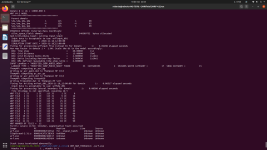Hi! I'm quite veteran at using WRF, but today I've found an error I've never faced before.
Today I decided to compile WRF via Intel compilers, to test out it against GCC with latests versions of them both and of libraries.
Well, compilation went smooth and everything seemed fine. real.exe worked flawlessly, and wrf.exe seemed to, but when the program had to start calculations...
As you can see, program shows this error:
"forrtl: severe (174): SIGSEGV, segmentation fault occurred"
Well, I can assure it's not a memory problem. ulimit was set to unlimited, and this same domain in WRF-GCC (compiled with GCC version) just uses 5Gb of RAM.
What can it be? Any ideas?
I'm totally out of ideas.
For more information, that may be relevant: WRF compiled with DMPAR worked, and wrf.exe ran (it was quite slower than GCC smpar, which is what I use now as "operative"). This problem is happening while compiling with SMPAR (why SMPAR? Well, I have a 1 CPU computer and the performance gain from DMPAR to SMPAR is impressive in my Ryzen CPU).
Today I decided to compile WRF via Intel compilers, to test out it against GCC with latests versions of them both and of libraries.
Well, compilation went smooth and everything seemed fine. real.exe worked flawlessly, and wrf.exe seemed to, but when the program had to start calculations...
As you can see, program shows this error:
"forrtl: severe (174): SIGSEGV, segmentation fault occurred"
Well, I can assure it's not a memory problem. ulimit was set to unlimited, and this same domain in WRF-GCC (compiled with GCC version) just uses 5Gb of RAM.
What can it be? Any ideas?
I'm totally out of ideas.
For more information, that may be relevant: WRF compiled with DMPAR worked, and wrf.exe ran (it was quite slower than GCC smpar, which is what I use now as "operative"). This problem is happening while compiling with SMPAR (why SMPAR? Well, I have a 1 CPU computer and the performance gain from DMPAR to SMPAR is impressive in my Ryzen CPU).

